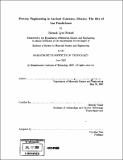Pottery engineering in ancient Guerrero, Mexico : the site of Las Fundiciones
Author(s)
Reitzel, Hannah Lynn
DownloadFull printable version (28.29Mb)
Other Contributors
Massachusetts Institute of Technology. Dept. of Materials Science and Engineering.
Advisor
Dorothy Hosler.
Terms of use
Metadata
Show full item recordAbstract
This thesis examines ancient pottery from the site of Las Fundiciones, Guerrero, Mexico. Because this site provides the only documented evidence of prehispanic metal smelting in Mesoamerica it is critical to examine artifacts found there, in this case pottery, using the tools of materials science. These tools allow archaeologists to see past "stylistic preferences" to the design, functional, and compositional differences in artifacts that result from choices among a range of processing alternatives. Thus, this thesis seeks to show that potters at Las Fundiciones were engineering their pottery in their choices of materials and design processes. A selection of pottery sherds (representing different functional vessel types) from the site were petrographically analyzed, and nine clays collected in and around the site were petrographically analyzed and subjected to a variety of chemical, mechanical, and thermal tests to determine their material properties. Clays are matched with petrographic groupings of potsherds, showing that potters were using local clays. The clays are ranked according to their ability to withstand thermal shock, since this is an easily quantifiable measure of the viability of ancient pots for use in food preparation. Lastly, the heat shock resistances of those clays used by ancient potters are analyzed with respect to the wall thicknesses measured in the potsherds to show that potters were consciously designing their vessels for specific functions. This thesis shows that ancient potters were making their vessels from local clays, that they were firing them between 650 and 800 degrees Celsius, and that they consciously made thinner vessels out of clay with lower thermal shock resistance. Vessels made of clays with higher thermal shock resistance have much higher average thicknesses, probably because these withstand everyday stresses better. (cont.) In summation, ancient potters at Las Fundiciones were altering the thicknesses of their pots to withstand the thermal stress of cooking, based on their empirical knowledge of the material properties of the clay.
Description
Thesis (S.B.)--Massachusetts Institute of Technology, Dept. of Materials Science and Engineering, 2007. Includes bibliographical references (leaves 64-66).
Date issued
2007Department
Massachusetts Institute of Technology. Department of Materials Science and EngineeringPublisher
Massachusetts Institute of Technology
Keywords
Materials Science and Engineering.